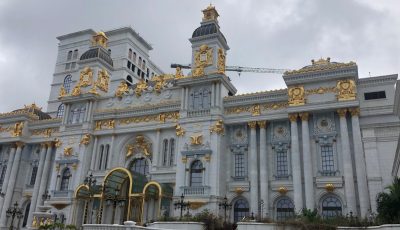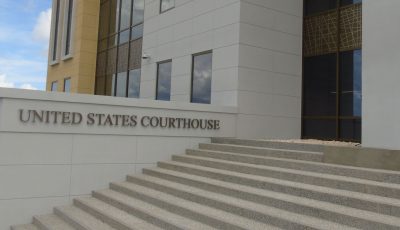Request for approval of settlement of suits vs disbarred lawyer, uncle opposed

Quichocho
Jung Ja Kim, a businesswoman who was awarded a $2.4-million judgment over her racketeering lawsuit against disbarred lawyer Ramon K. Quichocho and his wife, is opposing an investor’s request from federal court to approve a global settlement of claims in connection with separate lawsuits filed against Quichocho and his uncle over a lease of a Ladder Beach property.
Kim, through counsel Robert T. Torres, asked the U.S. District Court for the NMI to allow her intervene in investor Sin Ho Nam’s proceeding for the sole purpose of staying the court’s approval of any consent judgment and settlement proceeding in this case or otherwise issuing any order affecting the disposition of Ladder Beach property.
Torres asked the court that the stipulation for settlement in Nam’s lawsuit be stayed until the proceeding in the bankruptcy petition that Quichocho filed at the State of Washington is concluded or until relief from stay is obtained.
Last June, Nam asked the court to approve a global settlement of claims in connection with lawsuits filed against Quichocho and his uncle, Joaquin Q. Atalig, over a lease of a Ladder Beach property.
Attorney Stephen J. Nutting, counsel for Nam, stated that with the consent of Nam and his other client, Toshin Group International Inc., he negotiated a global settlement of both the Nam lawsuit and Toshin’s lawsuit against Quichocho and Atalig.
Nutting said the settlement included the full payment of all sums due to Nam under the settlement agreement in the amount of $207,000, and a new 55-year lease to Toshin as well as all attorney’s fees in the amount of $70,000 incurred in prosecuting Toshin’s complaint.
Nutting said the money to be paid to Nam and himself as Toshin’s counsel was to be paid from the sale of a new 55-year lease to an investment group, of which he was a member.
The lawyer said at the time of the settlement in February 2015, he learned that Quichocho had quitclaimed his interest in the Nam property to Atalig, to allow him to settle the claims, which has been brought on against him, largely as a result of untenable legal advice he had received from Quichocho.
As a result, Nutting pointed out, Atalig executed a new leases for 55 years in favor of Nam and Toshin as a part of the global settlement reached.
In Kim’s request to intervene, Torres said that on April 4, 2014, the court entered judgment against Quichocho and his wife, Francis, in the amount of $2,411,719.
Torres said during the process of collecting her judgment, Kim discovered that the Quichocho couple made a number of conveyances to their relatives, arguably to place their assets beyond her reach.
Torres said specifically, without notice to Kim, Quichocho fraudulently transferred his interest in the Ladder Beach property, four months after the $2.4-million judgment in the racketeering case issued against him.
Torres said when Kim filed for an order in aid of judgment to recover the Ladder Beach property in February 2015, Nam’s counsel, Nutting, sought to intervene, arguing that the Ladder Beach property had been made to settle Quichocho’s obligations in this case.
Torres said before Kim’s motion to attach the Ladder Beach property could be heard, however, Quichocho and his wife filed for protection under Chapter 7 of the bankruptcy code.
Torres said District Court Senior Judge Alex R. Munson, acting in place of U.S. District Court for the NMI Chief Judge Ramona V. Manglona for the hearing on Kim’s motion, stayed all recovery efforts on account of the automatic stay accompanying the filing of the bankruptcy petition.
In point of fact, Torres said, it was Nutting who apprised Kim’s attorney of the Quichocho bankruptcy filing.
Torres said in their opposition to Kim’s order in aid of judgment, the Quichochos took the position that they were free to transfer the Ladder Beach property to Atalig in order to settle his obligations to Nam in this case.
Torres said given the constraints of the automatic stay, however, and the reality that the propriety of the transfer is being litigated in the bankruptcy court to deny the Quichochos their discharge, the dictates of the stay should apply equally in his proceeding so that the bankruptcy court may determine whether the Ladder Beach property is, in fact, property of the bankruptcy estate.
Torres pointed out that it is one thing to transfer property to a bona fide purchaser for value, but that it is another thing entirely to transfer two lots of beach property to a close relative following the entry of a multi-million dollar judgment for only one dollar.
Torres said under these circumstances and the facts giving rise to the transfer in this case, the inescapable implication under the Uniform Fraudulent Transfer Act is that Quichocho was simply parking his property in a place where he hoped Kim would not know to look.
“Regardless of the nature of the transfer, the settlement involves property that arguably should be included in the bankruptcy estate,” the lawyer pointed out.
The Nam lawsuit was originally brought on as a result of defendants Quichocho and Atalig unilateral attempt to terminate Nam’s leasehold interest to certain real property in Ladder Beach.
The Toshin lawsuit was a similar case, where Quichocho and Atalig sought to unilaterally terminate a long-term pre-paid 55-year lease to Toshin and Shinji Fujie, which was immediately adjacent to the Nam property in Ladder Beach.
In 2014, Nam obtained a judgment against the defendants for failure to make payments due under a settlement agreement reached.
Toshin also obtained a partial summary judgment in Toshin’s favor, which vacated the termination notice issued by Quichocho and Atalig on Toshin’s Ladder Beach property. The CNMI Supreme Court affirmed the judgment in November 2014, according to court documents.



























